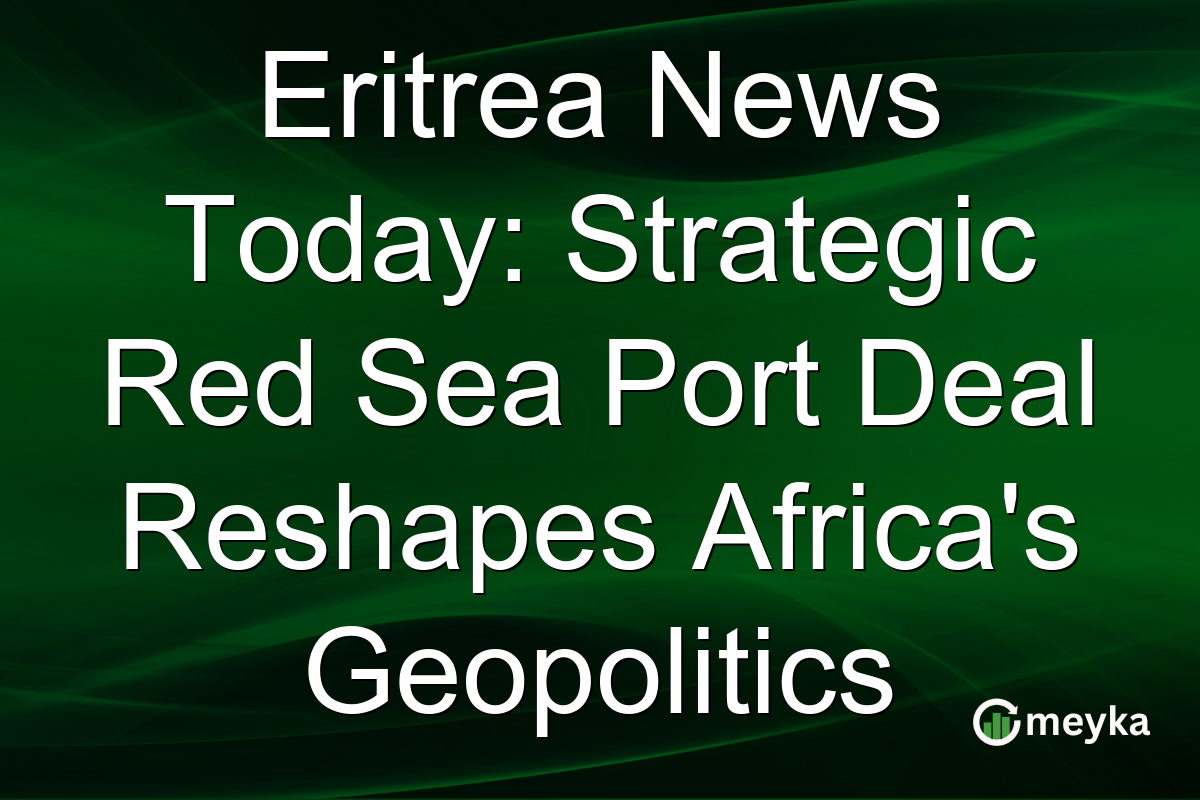Eritrea News Today: Strategic Red Sea Port Deal Reshapes Africa’s Geopolitics
Today, Eritrea grabbed international headlines by signing a strategic agreement involving its Red Sea ports. This development holds profound implications for Africa’s trade routes and regional geopolitics, positioning Eritrea at the center of attention in global logistics. Investors are keenly observing this move, understanding its potential to reshape security, trade, and investment flows across the Horn of Africa.
The Strategic Importance of Eritrea’s Red Sea Ports
Eritrea’s Red Sea ports have long been critical assets, offering direct access to one of the world’s most crucial maritime routes. As of October 2025, the recent agreement highlights Eritrea’s ambition to enhance its logistical capabilities. This deal is designed to boost maritime trade efficiency and reduce shipping times, thereby increasing competitiveness. Globally, analysts view Eritrea’s strategic location as pivotal to controlling trade flows across the Suez Canal, connecting Europe and Asia. This move is likely to bolster Eritrea’s role in international trade, making it a significant player in Africa’s economic landscape.
Impact on Africa’s Trade Routes and Geopolitical Status
The new Red Sea port deal is expected to significantly influence Africa’s trade routes. By modernizing its port infrastructure, Eritrea can facilitate smoother trade operations, which is crucial for landlocked countries in the region. As the Horn of Africa faces political and economic challenges, this development could stabilize and invigorate regional trade networks. Moreover, geopolitical risks tied to the Red Sea have historically deterred investments; however, this strategic improvement might mitigate such concerns, encouraging further foreign investments in Eritrea.
Global Investor Reactions and Economic Implications
Investors globally have shown heightened interest in Eritrea following the announcement. With new opportunities arising from improved port facilities, sectors like logistics, shipping, and manufacturing are anticipated to gain traction. This agreement positions Eritrea as a gateway to Africa’s burgeoning markets. Nevertheless, investors remain cautious of regional geopolitical tensions, which could impact trade reliability. The deal appears promising for international stakeholders seeking a foothold in Africa’s dynamic economic environment. A recent discussion on this was shared here.
Looking Forward: Eritrea’s Economic Outlook and Challenges
Eritrea’s economic prospects seem optimistic with this new deal, potentially boosting GDP and creating job opportunities. Enhancements in the port infrastructure could lead to notable improvements in trade dynamics and infrastructural development. However, challenges remain, including political stability and sustaining the momentum of infrastructural growth. The deal’s success hinges on Eritrea’s ability to manage these risks while leveraging the strategic location of its ports for long-term economic gains.
Final Thoughts
Eritrea’s Red Sea port deal marks a transformative step in its economic and geopolitical journey. While the agreement promises enhanced trade and investment opportunities, it also demands careful navigation of regional challenges. For investors, this development offers a chance to engage with Africa’s evolving markets, contingent upon Eritrea’s strategic management of its geopolitical and infrastructural advancements. This deal not only positions Eritrea as a pivotal player in African trade but also invites global attention, potentially setting the stage for further economic progress.
FAQs
The deal is significant because it enhances Eritrea’s logistical capabilities and trade efficiency, positioning the country as a key player in Africa’s trade routes and improving global connectivity.
The deal could stabilize and enhance Africa’s trade networks, offering smoother operations, reducing shipping times, and providing trade access for landlocked countries, thus boosting regional economic development.
Investors are interested due to new opportunities in logistics and shipping, though they remain cautious of geopolitical tensions. The deal positions Eritrea as a vital access point for Africa’s markets.
Challenges include maintaining political stability, managing infrastructural growth, and capitalizing on the strategic position of its ports amidst regional geopolitical risks.
Future prospects are optimistic, with potential GDP growth and job creation. Success depends on managing challenges and leveraging the improved port infrastructure to enhance trade and investment flows.
Disclaimer:
This is for information only, not financial advice. Always do your research.






